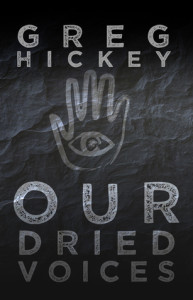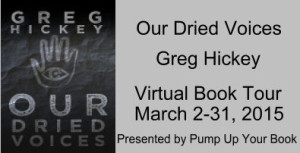Interview with Greg Hickey, author of Our Dried Voices
Greg Hickey was born in Evanston, Illinois in 1985. After graduating from Pomona College in 2008, he played and coached baseball in Sweden and South Africa. He is now a forensic scientist, endurance athlete and award-winning writer. He lives in Chicago with his wife, Lindsay. You can visit Greg’s website at www.greghickeywrites.com.
Connect with Greg:
Author Website: www.greghickeywrites.com
Author Blog: http://kinesophy.blogspot.com/
Facebook: https://www.facebook.com/GHWrites
Twitter: https://twitter.com/greghickey5
Goodreads: https://www.goodreads.com/author/show/8421481.Greg_Hickey
About The Book
Title: Our Dried Voices
Author: Greg Hickey
Publisher: Scribe Publishing Company
Publication Date: November 4, 2014
Pages: 234
ISBN: 978-1940368931
Genre: Dystopian / Science Fiction
Format: Paperback, eBook (.mobi / Kindle), PDF
Purchase
The Book:
Amazon: http://www.amazon.com/Our-Dried-Voices-Greg-Hickey-ebook/dp/B00N272GLO/ref=sr_1_1?s=digital-text&ie=UTF8&qid=1421353811&sr=1-1&keywords=Our+Dried+Voices+Greg+Hickey
Barnes & Noble: http://www.barnesandnoble.com/w/our-dried-voices-greg-hickey/1119998270?ean=9781940368931&itm=1&usri=our+dried+voices
In 2153, cancer was cured. In 2189, AIDS. And in 2235, the last members of the human race traveled to a far distant planet called Pearl to begin the next chapter of humanity. Several hundred years after their arrival, the remainder of humanity lives in a utopian colony in which every want is satisfied automatically, and there is no need for human labor, struggle or thought. But when the machines that regulate the colony begin to malfunction, the colonists are faced with a test for the first time in their existence. With the lives of the colonists at stake, it is left to a young man named Samuel to repair these breakdowns and save the colony. Aided by his friend Penny, Samuel rises to meet each challenge. But he soon discovers a mysterious group of people behind each of these problems, and he must somehow find and defeat these saboteurs in order to rescue his colony.
Book Excerpt:
I
The sound of the bells echoed across the colony.
They sounded five times, and by the end of the fifth peal everyone had stopped
what they were doing and started to walk toward the nearest source of the
noise. The bells had a tinny, hollow sound to them. To be sure, it was
unmistakably the sound of bells, but it lacked that rich, thunderous, rolling
swell once heard in passing by an old church at the top of the hour. Instead,
it was as though the sound of real bells had been recorded and re-recorded ad
infinitum until only bell-like sounds now remained.
The bells called the people to the midday meal. All
across the lush meadow, the colonists fell into a kind of reverie. Moments
earlier, they had been romping through the meadow or splashing in the river
with the joyful abandon of children, while others napped blissfully at the base
of a modest hill or fornicated with some momentary lover in the shade of a
spreading tree. But now their innocent laughter, their hushed excited voices,
their intermittent shrieks of pleasure all ceased for an instant as they moved
as one toward the sound of the bells. As soon as the fifth toll had faded in
the air, the human noise resumed as though it had never been silenced. The
colonists walked eagerly but unhurriedly, small, hairless, brown-skinned
people, all barefooted and dressed in simple, cream-colored smocks.
The bell sounds came from the seven meal halls
spread throughout the colony—long, tall, rectangular buildings erected from the
black, craggy rock characteristic of the mountains of Pearl, now smoothed down and
cut into bricks and painted a soothing off-white. Another smaller building
abutted one end of each meal hall. Their wan stone façades matched those of the
larger halls and there were no discernible entryways in their solid exteriors.
As the colonists entered each meal hall, they lined
up along the right-hand wall to wait for their food. The walls were painted a
pale sky blue, and on the far wall was a small square hole. One by one, each
diner stepped forward in line, a small, red light above the hole flashed, a
short clicking and whirring noise sounded and then a round, firm, dark brown
cake appeared at the edge of the opening. One by one, each colonist took the
proffered meal cake and carried it over to one of the many wooden tables or out
into the meadow.
Near the front of the line at one hall, a male
colonist turned to face the man behind him.
“Hellohoweryou?” said the first man.
“Goodthankshoweryou?” replied the second man.
“Goodthankshoweryou?”
“Goodthankshoweryou?”
The two men stared blankly at each other for a
moment. Then the first man blinked and said “Goodweathertoday.”
The second bobbed his head and grinned.
“Betterenyesterday.”
They continued to gaze at each other with vapid
expressions until the first man turned around and stepped forward in line. The
two men were right. It was Tuesday. It rained on Mondays. And thanks to the
colony’s weather modification system, it had rained every Monday, and only on
Monday, for hundreds of years.
***
When about half the colonists at this particular
meal hall had received their food, an adult woman moved to the front of the
line. A young boy, no taller than her waist, stood behind her. The woman
stepped up to the wall, the red light above the hole flashed… and nothing
happened. There was no clicking, no whirring, and no meal cake emerged from the
hole in the milky blue wall. Some people a few places behind the first woman,
by now so accustomed to the regular pace of the line, stepped forward in
anticipation of her taking the food and continuing on. When the line did not
move, they bumped awkwardly into the colonists in front of them, very much
surprised that there should be a fleshy, breathing, human body in their path
instead of empty space. Those closest to the front of the line fell silent when
they saw the woman had not yet received her meal, and then the silence spread
evenly and rhythmically down the line, like a row of pillowed dominoes falling
to the floor. Yet all the colonists continued to wear the same insipid
half-grin on their faces as they waited patiently for the food to be dispensed
and the line to creep forward once more.
A long, loud, whining shriek from the young boy
waiting with his mother at the front of the line broke through the stillness,
and it was this sound, not the actual interruption of the food service, which
seemed to have the greatest effect on those in the hall. The boy did not cry.
He shed no tears, and the sound which emerged from his mouth was not a
breathless and choked sobbing, or even the petulant howl of a child’s tantrum.
It was a primal, animal moan that rose from the depths of his unfilled stomach,
rushed up his throat with a cold and persistent ferocity and forced its way
over his teeth, throwing his head back as it broke from his lips. No one tried
to comfort the boy. His mother did not even turn around to look at him. Her
weak smile faded, but she continued to stare at the dark hole in the wall,
still waiting for her meal to appear. Then a child some dozen places back in
the line picked up the boy’s howl, and then a woman farther behind did the
same. Soon the entire line was wailing loudly.
Those colonists who had already received their
meals hunkered over their cakes and stuffed their last bites into their mouths.
One of them stood up, bumping hard into his table. The rest followed. They
walked hurriedly to the door, brushing past the onlookers from outside who had
gathered to see what all the noise was about. Those still in line stared
dazedly at the others around them, at the now half-empty hall, an incipient
question forming somewhere deep in their skulls.
A man in the middle of the line broke their
unsteady ranks first. He ran, stumbling over tables and chairs bolted to the
floor in his maddened dash toward the doorway. The rest of the line scattered
in his wake. Out through the door they went, cracking bony limbs on the wooden
furniture in their paths, pushing and trampling one another as they all tried
to force their way through the doorway at once, like blood cells pumped through
a clotted artery.
Those who had already finished their meals stood
outside in a loose ring several meters away from the entrance of the food hall,
and as the wild runners pushed their way through the door, they began to run as
well, picking up the wail of the unfed as they went. They ran in no particular
direction, a single mass exodus from the hall, teeming out across the gay green
meadows, up and over the soft, undulating hills, and their cries rippled
throughout the once-peaceful fields to fill the void left by the cessation of
the bells with a sound far more vibrant than those stale chimes which had just
called them to their uneaten meal.
Discuss this book in our PUYB Virtual Book Club at Goodreads by clicking HERE
Author Interview
Q: Welcome to The Writer's Life! Now that your book has been published, we’d love to find out more about the process. Can we begin by having you take us at the beginning? Where did you come up with the idea to write your book?
A: I got the initial spark for Our Dried Voices from the Eloi in H.G. Wells' novel, The Time Machine. In his novel, humanity diverges into two distinct species, one of which is the Eloi, who are frail and unintelligent and live a mostly blissful life without any need for physical or mental exertion. The question raised in Wells’ novel and Our Dried Voices is how humanity evolved to this state. Our Dried Voices explores humanity’s seemingly paradoxical quest to devote so much intellect to developing technologies to eliminate the need for said intellect.
Q: How hard was it to write a book like this and do you have any tips that you could pass on which would make the journey easier for other writers?
A: It was hard in the sense that any novel requires a lot of time and work. But the work itself wasn’t terribly painstaking. By the time I sat down to write the story, I pretty much knew where I wanted it to go. It was just of matter of filling in the words. Of course there were some sections that were more difficult to write than others, but I managed to get through them a little bit at a time. To other (aspiring) writers, just read and write as much as you can. You’ll get all sorts of kernels of ideas to start you off. Write them down. They may not amount to anything, but eventually you’ll find some worth exploring and expanding.
Q: Who is your publisher and how did you find them or did you self-publish?
A: My publisher is Scribe Publishing Company (http://scribe-publishing.com). I sent them a query letter when I discovered an author I follow on Twitter published her first book with them.
Q: Is there anything that surprised you about getting your first book published?
A: I think the biggest surprise was having a publisher say yes. There were a lot of rejected query letters before I contacted Scribe, and I was very close to self-publishing when they stepped in. I never really got dispirited, but I began to think that established agents and publishers had no interest in a debut novelist, so I had to read that final acceptance e-mail a few times before it sunk in.
Q: What other books (if any) are you working on and when will they be published?
A: I’m currently editing a novel entitled The Friar’s Lantern. It’s a gamebook (a fancy word for choose-your-own-adventure story) that addresses questions about free will and determinism. The story centers around a philosophy problem called Newcomb’s paradox and a murder trial in which you are a jury member. There is no publication date yet, but I hope to have a final draft done around the middle of this year.
Q: What’s your favorite place to hang out online?
A: I like Twitter as a focused information feed where I can get updates on news, sports, books, etc. that I care about.
Q: Finally, what message (if any) are you trying to get across with your book?
A: The big message in Our Dried Voices is that independent critical thought is essential to the human experience. The capabilities of our minds distinguish us from other animals, and we have a responsibility to ourselves and to each other to think, choose and act in order to make our lives better.
Q: Thank you again for this interview! Do you have any final words?
A: Thank you! I hope readers enjoy Our Dried Voices, and I am more than willing to discuss the book if you want to e-mail me at greghickey5@gmail.com.


































































































































































































Leave a Comment